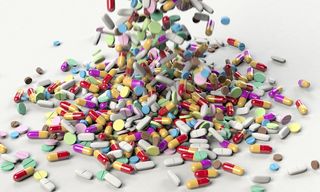
ADHD
Integrative Management of ADHD
Important considerations when deciding what treatment to use.
Posted January 29, 2020 Reviewed by Davia Sills

Finding the most appropriate treatment of ADHD poses many challenges
You may have found this blog because you are searching for information that will help you evaluate various treatment choices for a child who has been diagnosed with ADHD. Perhaps you are struggling with ADHD yourself. Whatever your situation, the treatment of ADHD should be individualized to your (or your child’s) particular symptoms and preferences.
Different ADHD symptoms may respond quite differently to the same treatment, whether it is a prescription medication or a complementary and alternative medicine (CAM) therapy. For example, for some people, the same pharmaceutical or CAM approach may work better for hyperactivity or problems focusing than for others with the same problem.
The most effective and appropriate pharmaceutical, behavioral, or CAM treatment of ADHD depends on the particular symptoms that are being addressed, how severe they are, and each person’s unique history in terms of how well or poorly they responded to previous conventional or CAM treatments. Other important considerations include the side effects caused by medications or natural supplements, and whether other (i.e., "co-morbid") mental health or medical problems are being treated concurrently.
The choice of treatment should also take into account whether you can find a therapist in your geographic area who is qualified to treat you (or your child) using a particular approach (e.g., EEG biofeedback) or to provide competent advice about the safe, appropriate use of conventional prescription medications or natural product supplements. If you are considering taking herbal medicine or any other natural product supplement, it is prudent first to notify the health care provider who is treating you (or your child) for ADHD in order to be sure you understand benefits and potential safety issues associated with the natural supplement you are considering trying. Before taking any natural product supplement, it is wise first to identify a reputable brand with a high safety rating.
Important considerations when deciding how to approach symptoms of ADHD
I encourage you to work with a health care provider who has expertise in ADHD, starting with a thorough assessment of medical, psychological, cultural, or social factors that may contribute to your (or your child’s) symptoms. For example, toxic exposure, food sensitivities, poor nutrition, chronic stresses, and family and cultural issues may "look like" ADHD, but when these problems resolve in response to appropriate medical treatment, lifestyle changes, or individual or family therapy, the symptoms sometimes improve dramatically, and no further treatment is needed.
Although there are risks associated with prescription stimulants, selective serotonin reuptake inhibitors (SSRIs), and other medications used to treat ADHD, conventional pharmaceuticals are often effective and well-tolerated. However, when medication does not help or causes adverse effects, it is both prudent and appropriate to either reduce the dose or stop taking the medication. It is always preferable to make changes in medications in consultation with the physician or other health care provider who prescribed the medication so that you will know about possible safety problems that may arise when changing a medication dose or abruptly stopping it.
If you (or a child) have tried prescription medications for ADHD, and they either haven’t worked, or you (or a child) have experienced adverse effects, it is reasonable to consider trying select natural products where there is evidence supporting both safety and efficacy. Deciding whether to take a natural product alone or together with medication should always be done in consultation with the physician or other health care provider who is treating you (or your child’s) ADHD.
Dietary habits and food allergies
In some cases, dietary habits and food allergies may underlie symptoms of inattention or hyperactivity. If you are a parent of a child diagnosed with ADHD and are considering trying an elimination diet or making other changes in your child’s diet, it is prudent to first consult with your child’s pediatrician or a nutritionist who has expertise treating ADHD in children before initiating any elimination diet.
Natural product supplements
In some cases, zinc supplements at doses of 150mg per day may be helpful when symptoms of hyperactivity and impulsivity do not improve with stimulants alone. Zinc may be safely combined with stimulants and other medications used to treat ADHD. Limited research findings suggest that supplementation with iron (ferrous sulfate up to 80mg per day) may be helpful for symptoms of distractibility and inattention.
High doses of omega-3 essential fatty acids (up to 16g per day) may improve ADHD symptoms. Preliminary findings suggest that standardized extracts of the herbals Ginkgo biloba, Panax quinquefolium, Pinus pinaster, and Bacopa monnieri, may be both safe and effective treatments of childhood ADHD symptoms.
Accumulating research findings suggest that a proprietary, broad-spectrum micronutrient formula containing vitamins and minerals may be a safe and effective treatment of ADHD. Recent findings suggest that Saffron dosed at 20 to 30mg per day may be as effective as stimulants.
Yoga, massage, and EEG biofeedback
Some evidence suggests that regular yoga or massage may reduce the severity of ADHD symptoms. Finally, in cases where conventional pharmaceuticals are ineffective or poorly tolerated, certain EEG biofeedback training protocols, including sensorimotor rhythm (SMR) training for primarily hyperactive type ADHD and theta suppression for primarily inattentive type ADHD, should be considered. In some cases, regular EEG biofeedback over several weeks may reduce the severity of ADHD symptoms enough to permit a reduction in the dose of prescription medication, resulting in improved response and fewer adverse effects.
Bottom line
The choice of conventional pharmaceutical treatments, behavioral interventions, and CAM treatments of ADHD should take into account each person’s particular symptoms and unique history in terms of how well or poorly they previously responded to pharmaceuticals, cognitive-behavioral therapy (CBT), or complementary and alternative medicine (CAM) treatments. Other important considerations when deciding on treatment include the risk of side effects caused by medications or natural supplements, and whether other (i.e., "co-morbid") mental health or medical problems may be causing or exacerbating symptoms of inattention or hyperactivity.
Although many CAM approaches are used to treat ADHD, at this time, there is limited research evidence for most of them. Large placebo-controlled studies are needed to evaluate further the effectiveness of trace elements such as zinc, iron, omega-3 fatty acids, single herbals, herbal formulas, and micronutrient formulas before they can be generally recommended. For readers interested in more detailed reviews of the evidence for non-pharmaceutical treatments of ADHD, I’ve included several resources (see references).
References
Lake, J., ADHD, Ch 37, in Clinical Naturopathy: An Evidence-based Guide to Practice, 3nd edition, Eds. Sarris & Wardle, 2020, Churchill Livingstone, Australia.
Lake, J., Sarris, J. Complementary and Alternative Treatments for ADHD: What the Evidence Suggests, Oct, 2019 Psychiatric Times.
Alternative Treatments of Attention-Deficit Hyperactivity Disorder (ADHD): Safe, Effective and Affordable Approaches and How to Use Them, J. Lake (first published 2015, revised and updated 10/2019).



